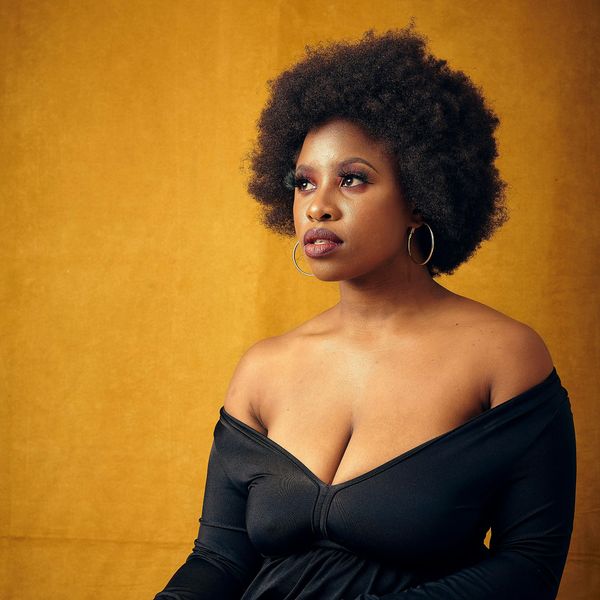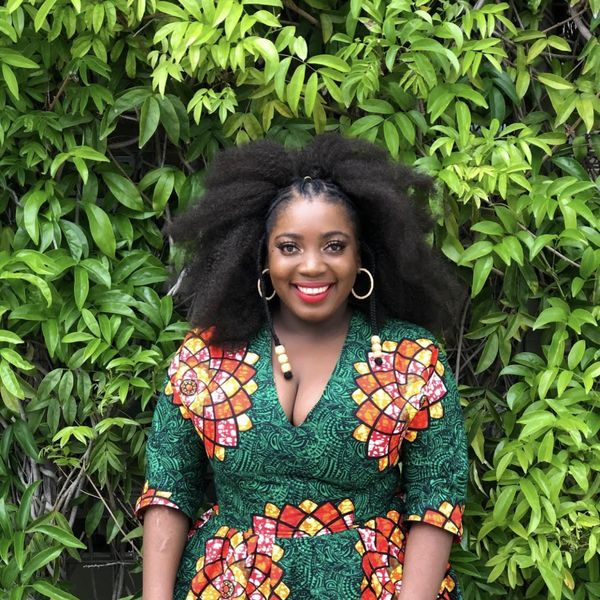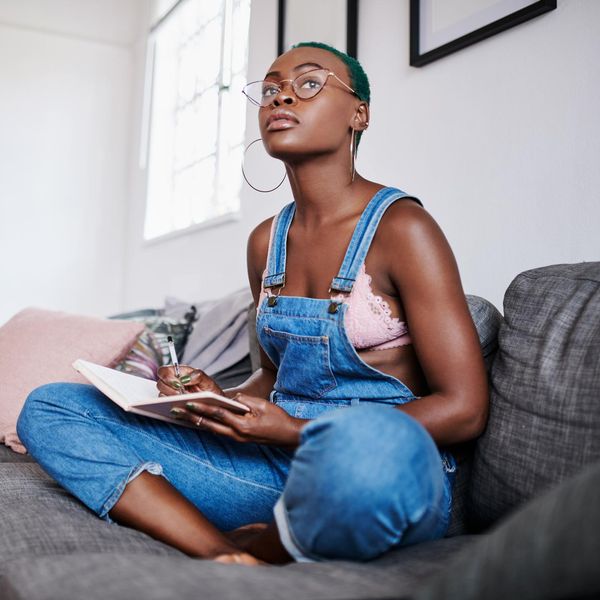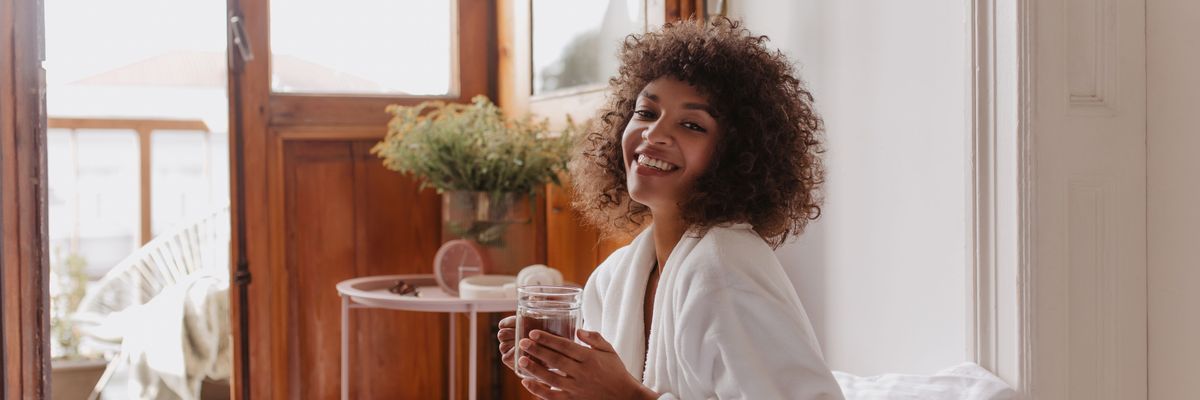Are You "Waiting On Your Boaz"? Make Sure You Know What That Means, Sis.

Although I grew up in the church, I've never been someone who is big on church clichés. No matter how popular a phrase might've been, I was the kind of person who didn't simply hop on the bandwagon; I would research things first. That's why I know saying, "This too shall pass" is nowhere in the Bible (it's actually attached to Hebrew and Persian folklore).
Or, when I hear a Christian tell a little girl to be like Queen Esther, I often think to myself, "So, you know she spent the night with a pagan king and couldn't reveal that she was Jewish before she married him, right?" (Esther 2:12-14) This means that he probably had sex with her, just like all of those other women that he was "interviewing", so she probably wasn't a virgin on her wedding night.
And then there's Ruth. More specifically, Ruth and Boaz. Pretty much every time I hear or read a woman say, "I'm just waiting on my Boaz", I find myself either saying or thinking, "And that just might be why you're still waiting, sis."
Waiting for your Boaz. If there's one thing that I think far too many of us are way too guilty of, it's romanticizing the Bible. Was Boaz a good man? All evidence certainly points to that. But for those of you who want a man to pursue you and work hard for you, eh, Boaz isn't really your guy.
What The Bible Really Says About Waiting for Your Boaz
You'd be better off declaring that you're "waiting for Jacob" since he actually put in hard years of labor (technically, 14 of them—Genesis 29:20-35) for Rachel. Hmph. Even then, some might say that was karma because Jacob tricked his father, Isaac and stole from his brother, Esau "thanks" to his mother, Rebekah's little scheme and then his mother's brother, Laban turned around and tricked him. See what I mean? On the surface, does it seem like a beautiful gesture to have a man toil for your hand in marriage for years on end? Maybe. But if Jacob and his mom hadn't been so sneaky and conniving, perhaps he wouldn't have ended up with a wife he didn't want first (Leah) or he wouldn't have had to work at all.
That's why, I think it's so important to know what you're saying and why you're saying it before you actually do. And when it comes to waiting for your Boaz, as you're about to see in a sec, every time you put that into the Universe (Proverbs 18:21), you are saying more than a mouthful.
Naomi Was the Mastermind
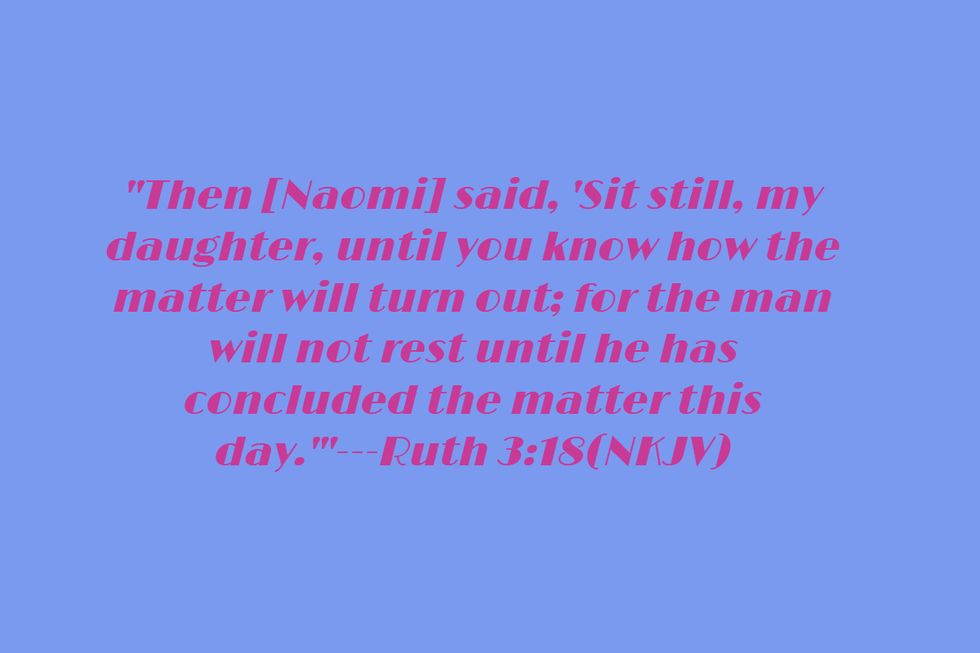
The Book of Ruth really is one of my favorite books of the Bible. It's so rich that there's not enough time to get into all of the details. If you want a blow-by-blow account of each chapter, The Gospel of Ruth: Loving God Enough to Break the Rules is a pretty stellar read. For now, let's just go over a very brief recap. Naomi was a woman who had two sons that died, leaving behind two widows—Ruth and Orpah (fun fact: Oprah was named after Orpah but her aunt misspelled her name). When Naomi decided to return back to her homeland, Ruth went with her (Ruth 1). With no money and no idea what to do next, Ruth went to glean in a field of one of Naomi's relatives. His name was Boaz.
Boaz was kind to Ruth, no doubt. But other than allowing her to gather as much food as she could handle, he didn't do much else. It was Naomi who started to devise a plan in hopes of getting Boaz and Ruth together. First, that Ruth not go into any other field but Boaz's (Ruth 2:22-23). Next that she do the following:
"One day Naomi said to Ruth, 'My daughter, it's time that I found a permanent home for you, so that you will be provided for. Boaz is a close relative of ours, and he's been very kind by letting you gather grain with his young women. Tonight he will be winnowing barley at the threshing floor. Now do as I tell you—take a bath and put on perfume and dress in your nicest clothes. Then go to the threshing floor, but don't let Boaz see you until he has finished eating and drinking. Be sure to notice where he lies down; then go and uncover his feet and lie down there. He will tell you what to do."—Ruth 3:1-4(NLT)
Nowhere in the Book of Ruth does it say that Boaz asked Ruth out or even that he was pining away for her. It was Naomi who said, "Oh, Boaz? Yeah, I know him. He's my late husband's people. Here's how you can really get his attention." Bookmark that as we move on.
Ruth Did Most of the Legwork
After hearing Naomi's instructions, Ruth simply replied with, "I will do everything you say." (Ruth 3:5—NLT) She then got to work. Literally. Ruth applied some essential oils. She put on her best clothes. She went to see Boaz, uninvited, when, as the New Living Translation of Ruth 3:7 tells us, Boaz had drank and was "in good spirits". It was then that Ruth went into his sleeping space. Now peep what the author of the book that I referenced earlier writes about this part of their journey:
"Clearly, the storyteller has loaded the story with sexual overtones. Language full of double-meanings, the isolated setting, a man and woman alone in darkness, Ruth covering Boaz's "feet" [which some Jewish scholars say could be a euphemism for penis]—all combine to create an aura of ambiguity intended to leave the reader wondering how much of Boaz she uncovers and what Boaz will do with this interesting and unexpected opportunity when he wakes up."—pg. 147
Y'all, Ruth straight-up seduced this man. Only Ruth, Boaz and God Himself know how far things went, but I'll just say that it's not the kind of "date" that you'll hear a lot of pastors or mothers of the church recommend that folks go on. Still, it's in the Bible. And no, Boaz did not come onto Ruth. Ruth came onto Boaz. And there is absolutely no indication in the story that if Naomi had not thought the plan up and Ruth had not followed through that Boaz wouldn't have remained being anything more than "a really nice guy".
So, when you say that you are "waiting on your Boaz"—what are you saying exactly? That you're waiting for a nice man to come along, period? Or that you are waiting for a good man like Boaz to pursue you? If it's the former, I get it. If it's the latter and you intend to not put some real sweat equity into the dynamic, like I said…you could be waiting for a really long time.
A part of the reason why Ruth is my girl is because, like the subtitle of the book states, she didn't follow the rules. She didn't think that only a man should "pursue" a woman in order for a relationship to work (Adam didn't pursue Eve; King Xerses didn't pursue Esther. Both couples still had really powerful and biblical love stories—Genesis 2 and Esther 2). Ruth was bold. Ruth was forward. Ruth was a risk taker. And yes, it paid off. Big time.
Boaz Was a Gentleman but Definitely NOT the Initiator
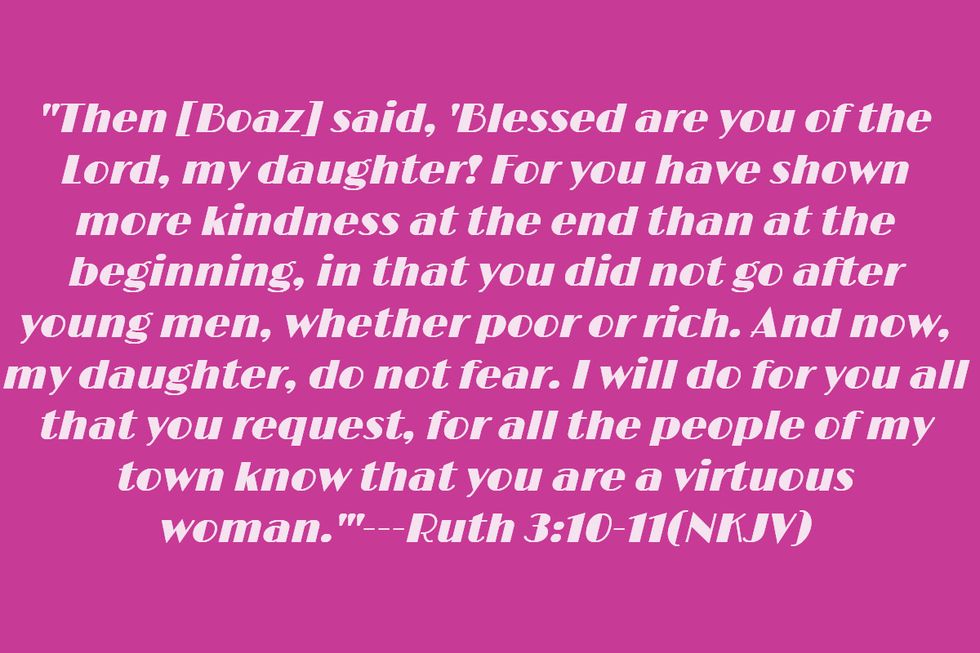
If you continue to read through the Book of Ruth, you'll see that once Ruth stepped out and made her presence known (and then some) to Boaz, he protected her throughout the rest of the night and then figured out how to make her his wife. Again, all of this wasn't about love and romance, though. She was a Moabite (pagan). Plus, back then, women didn't spend the night with men who weren't their husbands. According to the culture, she could've been severely punished, even stoned to death. Yet, remember how Naomi said that she was gonna find Ruth her own home? Naomi knew all of this. There must've been a part of her that knew Boaz may not ever make the first move. So, she came up with a way to expedite everything. In other words, the story isn't so much "romantic" as it was calculated on Naomi's part and somewhat obligatory on Boaz's. Not to say that he didn't care for Ruth, but again, if you put culture into all of this, his sudden "swiftness" (which ironically is what Boaz means in the Hebrew language; Ruth means "friend") was to protect this woman and ultimately, quite possibly, save her life. He wasn't so much "in love" as he was being noble.
If you continue to read the story (there are four chapters), Boaz does some negotiating for Ruth's hand in marriage, they get married, have sex and conceive a son by the name of Obed who eventually becomes King David's grandfather and someone who is directly in the bloodline of Christ. It's a beautiful story. Yet again, it's not so much because of Boaz. Boaz was reactive. It was Naomi and Ruth who were proactive.
Here's another thing to consider. Remember, the Bible was translated into English. It's originally an eastern culture book with a ton of Hebrew characters in it. According to the Midrash (which is basically a collection of Jewish commentaries), the Shir ha-Shirim Zutta, Boaz and Ruth conceived Obed on their wedding night. Guess what happened the following day, though. Boaz died (he was considerably older than Ruth so, it's quite possible).
Yep. So, think long and hard—are you waiting for a good man who you'll have to seduce, who marries you, partly out of obligation, only for him to die the next day and leave you to raise the son the two of you made alone? Are you really?
Let God Write Your Own Love Story
Y'all, I'm not here to rain on your parade, I'm really not. I'm just here to enforce one of my favorite Message Version verses in the Bible—"It's best to stay in touch with both sides of an issue. A person who fears God deals responsibly with all of reality, not just a piece of it." (Ecclesiastes 7:18—Message) While it can be tempting to treat the coupledom stories of the Bible like they are fairy tales, at the end of the day, they are simply real people, having real experiences, where we are fortunate enough to see how God works in the midst of their good and not-so-good decisions. Their love stories are not told so that we'll mimic them so much as we'll remember that God has His hand in our life, just as much as He did in theirs. Oh, and so we can see what might be a good idea and…what might not.
Maybe at another time, I'll share why the fact that Ruth pursued Boaz doesn't bother me in the least. Yeah, another verse that could stand to be broken all the way down is "he who finds a wife" (Proverbs 18:22); especially since "find" means things like "to come upon by chance", to "realize" and to "consider". Also, since the very first love story did not consist of a man pursuing at all. Adam was asleep. God did it all (words to live by—Genesis 2). I'm simply saying that no, I'm not out here "waiting on my Boaz". I want my husband and I want it to be my individual journey. That was Ruth's. I want my own.
Some women have the "I'm waiting on my Boaz" so deeply ingrained into them that they will say it until the cows—or their husband—comes home (whichever comes first). But as for you, I hope this gave you a little something to think about. Words are powerful. Try and not put things, even "spiritual" things, into the world, just because everyone else might be saying it. Seek out the truth and reality about matters for yourself. You might just realize that you don't want what you thought you did. You might not want to wait on a Boaz. You might want God to simply lead you to your own husband in a totally different way. And sis, at the end of the day, I actually think that's a good thing. A really good thing.
Feature image by Shutterstock
Originally published on March 8, 2020
This Is How To Keep 'Holiday Season Stress' From Infecting Your Relationship
Hmph. Maybe it’s just me, but it seems like there is something really weird happening in the fall season air (because winter doesn’t officially begin until December 21) that cuddle season is in full swing while break-up season is as well. In fact, did you know that break-ups are so popular during the holiday season that December 11 is deemed Break-Up Day?
The reasons why relationships shift around this time vary; however, I did both roll my eyes and chuckle when I read that a very popular one is because it’s an easy way to get out of getting one’s significant other a Christmas present. SMDH.
Anyway, I personally think that the less shallow folks out here may contemplate calling things “quits” or they at least distance themselves a bit from their partner (and what I’m referring to is serious relationships) due to all of the stress and strain that oftentimes comes with the holidays whether it be financial, familial, due to their tight schedules or something else.
Listen, I would hate for you and your man to miss the fun and happiness of experiencing this time of year, all because you are so overwhelmed or irritated that you can’t really enjoy it. That’s why I have a few practical tips for how to avoid allowing the typical holiday season stress from INFECTING your relationship.
Manage Your Expectations
 Giphy
GiphyUnmanaged expectations. If there is a main reason why the holiday season tends to be so stress-filled for so many people, I’d bet good money that this is the cause. And when you’re in a long-term relationship, expectations can manifest themselves in all sorts of cryptic and/or unexpected ways. You might have relatives who assume that you are going to be with them for Thanksgiving or Christmas when you have other plans in mind. You might be thinking that you are going to spend one amount for presents while your man is thinking something totally different. When it comes to scheduling, your signals may be crossed.
And you know what? To all of these scenarios, this is where clear and consistent communication come in. Don’t assume anything. Don’t dictate anything either. From now until New Year’s, mutually decide to check in once a week, just to make sure that you are both on the same page as it relates to the holidays and what you both are thinking will come along with it. The less blindsided you both feel, the less stressed out you will be. Trust me on this.
Set (and Keep) a Budget
 Giphy
GiphyOkay, so I read that last year, 36 percent of Americans incurred some type of holiday-related debt. Hmph. Last year, there was still some sense of normalcy in this country, chile, so I can only imagine what finances are gonna look like over the next several weeks. That said, since I don’t know a lot of people who don’t find being broke stressful, make sure that you and your bae set a budget and then stick to it this year — no ifs, ands or buts.
Because really, y’all — it doesn’t make sense to deplete savings and/or max out credit cards for a few days of giggles only to be damn near losing your mind because you don’t know how to make ends meet come Dr. Martin Luther King, Jr. Day.
And by the way, this tip doesn’t just speak to things like food and gifts; I also mean travel. If it doesn’t make a ton of sense (or cents) to be all over the place this year — DON’T BE.
Keep Matthew 5:37 at the Forefront
 Giphy
GiphyIf off the top of your head, you don’t know what Matthew 5:37 says, no worries, here ya go: “But let your ‘Yes’ be ‘Yes,’ and your ‘No,’ ‘No.’ For whatever is more than these is from the evil one.” That verse right there? Oh, it’s a boundaries lifesaver! I say that because do you see “maybe” or “I’ll think about it” in there? Nope. LOL. It says that you should tell people “yes” or “no” and leave it at that — and that complements Anne Lamott’s quote, “’No’ is a complete sentence” impeccably well. Yeah, you’ve got to remember that anything beyond a yes or no to a request is privileged information; you don’t owe anyone details or an explanation.
Besides, if you are really honest with yourself, when someone asks you something and you give a “Umm, let me think about it” kind of reply, more times than not, you already know what your answer is going to be — so why not let you both off of the hook? Give your response. Commit to that. And let everyone (including yourself) get on with their lives and schedules.
I promise you that when it comes to those holiday parties, you are pissing more folks off by not RSVP’ing or doing so and not showing up than just saying, “Thank you but not this year” off the rip.
Remember That Your Personal Space Is Privilege Not a Right
 Giphy
GiphyA friend of mine recently bought a new house and invited me over to come see it. He’s a single man with no children, so as I was taking in all of the space that he had, especially as I walked through his finished basement, I joked about relatives coming to live with him. “Hell no” and “absolutely not” were pretty much his immediate responses as he went on to say that some folks even had the nerve to be offended when he told them that he had no intentions on taking DNA in.
Ain’t it wild how people think that your stuff is their right? And yes, that brings me to my next point. Your home is your sanctuary space. If you want to host folks this year — cool. If not, ALSO COOL. Please don’t let folks (family included) guilt you into how they want you to act or even into what they would do if the shoe was on the other foot. You are not them — and as one of my favorite quotes states, “If two people were exactly alike, one of them would be unnecessary.” (A man by the name Larry Dixon said that.)
Hell, my friends? They know that I am good for sending them random things that they need or even want all throughout the year. Coming over to hang out at my pace, though. Uh-uh. Chalk it up to being a card-carrying member of the ambivert club yet I like keeping my living space personal — and I sleep like a baby, each and every night, for feeling that way.
Always remember that your space, your time, your resources, your energy and shoot, yourself period (including your relationship), are all things that are your own. You get to choose how, when and why you want to share them. The holiday season is certainly no exception.
Cultivate Some “You Two Only” Traditions
 Giphy
GiphyIt’s not uncommon for some couples to hit me up after the holiday season to “detox.” Sometimes it’s due to the financial drama (and sometimes trauma) that they experienced. Sometimes it’s because they allowed their relatives (especially in-laws) to get more into their personal business than they should’ve. More than anything, though, it tends to be because they didn’t get enough quality time together and so ended up feeling “disconnected.”
Please don’t let that happen. Listen, I’m not even a holidays kind of woman and yet, I will absolutely sit myself down with some hot chocolate and chocolate chip cookies to enjoy a Hallmark holiday film or two. Aside from the fact that most of them are lighthearted and sweet, I also like that they usually focus on couples loving on each other amidst all of the holiday beauty and ambiance — which is something that all couples should set aside some time to do.
Maybe it’s a vacation. Maybe it’s a staycation. Or maybe it’s my personal favorite, A SEXCATION. Whether it’s for a few days, the weekend or even overnight — don’t you let the holidays go by without setting aside time for you and your man to celebrate one another. Don’t you dare (check out “Are You Ready To Have Some Very Merry 'Christmas Sex'?”).
GET. SOME. REST.
 Giphy
GiphyI once read that 8 out of 10 people get stressed out over the holidays and 3 out of 10 lose sleep during to it — and when you’re stress-filled and sleep-deprived, that can absolutely lead to hypersensitivity, making mountains out of molehills and even not being in the mood for sex.
Your relationship can’t afford to go through any of this, so definitely make sure to prioritize rest. I don’t care how unrealistic it might seem during this time, sleep should never be seen as a luxury; it will always and forever be a great necessity.
That said, try to get no less than six hours of shut-eye in (check out “6 Fascinating Ways Sex And Sleep Definitely Go Hand In Hand”) and even ask your bae to take a nap with you sometimes (check out “Wanna Have Some Next-Level Sex? Take A Nap, Sis.”). Not only will sleep help to restore your mind, body and spirit but, when it’s with your partner, it’s an act of intimacy that can make you both feel super connected, even in the midst of what might feel like chaos.
___
Holiday season stress is real. Still, never give it the permission or power to throw your relationship off. Put you and your man first and let the holidays be what they are gonna be, chile.
Let’s make things inbox official! Sign up for the xoNecole newsletter for love, wellness, career, and exclusive content delivered straight to your inbox.
Featured image by Shutterstock
Whew. Did you know that somewhere around 122 million Americans travel during the holiday season? Listen, I went to see my godbabies this past September and got caught up in a crazy ass traffic jam at BNA (the Nashville airport) that damn near has me considering air travel ever again — especially during this time of the year.
Besides, it’s not like it’s a written rule that you have to travel over the holidays. In fact, if you want to play it chill this year, why not enjoy a staycation instead? Although it might seem like it’s a “poor man’s compromise,” as you’re about to see, it actually…isn’t.
1. Go All Out with the Christmas Décor
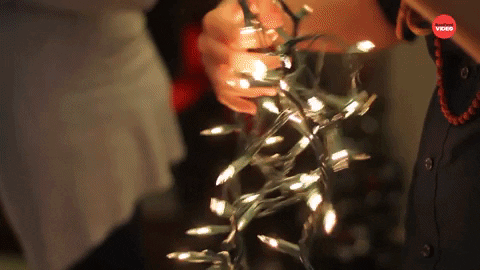 Giphy
GiphyThere is someone I know who is so obsessed with Christmas, she’s damn near annoying-borderline-terrifying. I’m. Not. Kidding. Yet hey, if you’re going to do a holiday-themed staycation (emphasis on “holiday-themed”), that’s kind of how you’ve got to be. Some décor ideas include:
- A fresh Christmas tree (is the most ideal) that is ultimately decorated
- Wreaths on outside and inside doors
- Garland (with twinkle lights) in predictable and unpredictable places
- Poinsettias
- Mistletoes
- Snow globes
- A stocking (with some of your favorite things in it)
- Fake snow
- Stars
- Angels
- Candy canes
- A BLACK Santa (LOL)
I mean, since you are going to be spending a lot of time at home, it can feel like a mini-winter wonderland if you are intentional about doing more decorating to your living space than you ever have before!
2. Buy a Couple of Christmas-Themed PJs
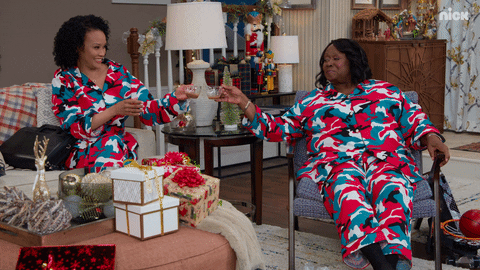 Giphy
GiphyWhile I was doing some research on a totally different topic, I happened upon an article that talked about the psychology behind why we should be intentional about what we wear to bed. When you stop to think about the fact that (hopefully) you are sleeping somewhere between 6-8 hours every night, it would make sense that things like the color and fabric of your sleepwear would have a real impact on you — even subconsciously.
Well, when it comes to Christmas décor, specifically, not only does it take you back to nostalgic memories, it can also boost your moods. So, aside from being on-10 with your Christmas décor, also invest in some Christmas-themed PJs. Since you’re going to be doing a lot of lounging around (RIGHT?), do it in something that makes you think about all of your favorite things about this time of year.
3. Cop Some Christmas-Scented Candles
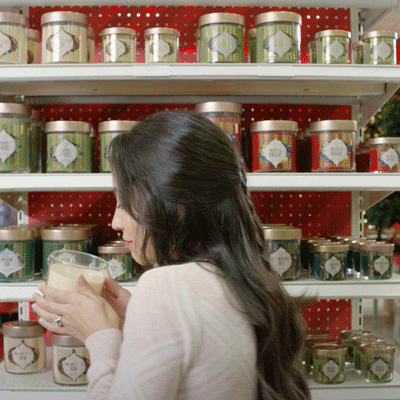 Giphy
GiphyThere really is no telling how many articles that I’ve written where I am singing the praises of scented soy candles. Candles are soothing, comforting and a very easy way to reduce stress. Also, since it gets darker quicker and for a longer period of time around this time of the year, candles provide a relaxing vibe to your home. Since it is Christmastime, go with scents that are reminiscent of the season:
- Cinnamon
- Vanilla
- Cranberry
- Apple
- Pine
- Frankincense and Myrrh
- Peppermint
- Cashmere
- Ginger(bread)
- Orange
- Sugar Cookies
- Sandalwood
- Cloves
- Cedarwood
- (Hot) Chocolate
Personally, one of my favorite candle companies is Goose Creek. Their signature collections will have your entire house smelling like a high-end bakery. No exaggeration.
4. Play Some Winter-Themed ASMR Sounds
 Giphy
GiphyI’m from Nebraska and my mother was a New Yorker. So, if there is one thing that I like, it’s seasons and that includes snow during wintertime. Unfortunately, Nashville is cray-cray when it comes to that. If, where you live, the weather is all over the place too (which is why I think it’s insane that some people still give pushback to global warming) and you would like for it to at least seem like you are in your own winter wonderland — invest in some fake snow to strategically place around your home.
Oh, and don’t forget to turn on some winter-themed ASMR sounds too. YouTube has videos that run for hours on end that feature blizzards and howling winds that really can make you feel like you are in the midst of an ice storm.
5. Host a Holiday Movie Marathon
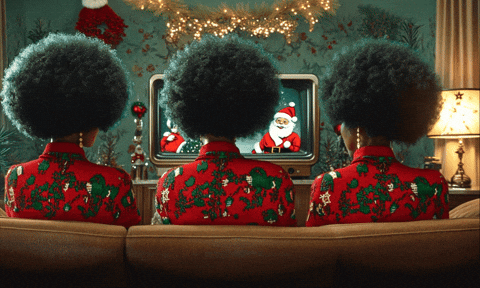 Giphy
GiphyOne thing to remember about a staycation is it doesn’t mean that you have to be alone or that the only people who can participate are the ones who live with you. Since a staycation is simply about staying close to home instead of traveling afar — absolutely consider having some of your favorite people over for a holiday-themed movie marathon. Shoot, Black America Web even did you a solid by publishing “25 Best Black Christmas Movies Of All Time;” plus, Tubi has a Black holiday hits section of indie films too.
Oh, and make sure to get creative with the Christmas-themed snacks. Some ideas? Some Kentucky-fried turkey tenders with cranberry hot sauce (recipe here), some Holiday Hot Spinach Dip (recipe here), some Grinch Kabobs (recipe here), some roasted pecans (recipe here) and some Pomegranate Guacamole (recipe here).
6. Spend a Night (or Two) at a Hotel or Vacation House
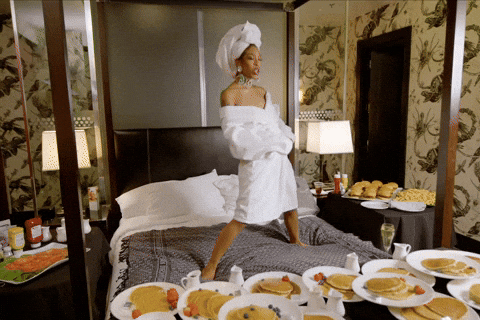 Giphy
GiphyJust like you don’t have to be alone during a staycation, you also don’t have to be cooped up in your house the entire time. Get a change of scenery in your own city by spending the night in a hotel that you’ve always wanted to try out or renting a vacation house for you and some of your folks to hang out in during the time between Christmas and New Year’s Day. I have a “love little sister” who does this randomly when she needs a break from her work as a therapist. She says that it’s damn near like taking a trip (and she has PLENTY of passport stamps; trust me).
7. Have Brunch or Dinner at a Christmas-Themed Restaurant
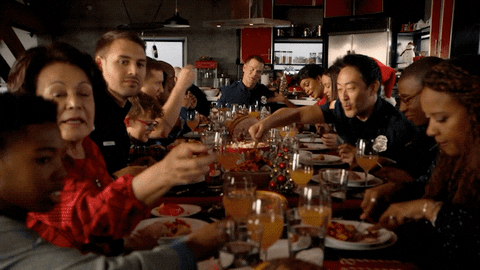 Giphy
GiphyIf nothing puts a bigger smile on your face than the thought of DoorDashing meals and barely even touching your stove during your staycation — hey, I am right there with you. Do consider going out to brunch or dinner during your chill time, though. It’s another way to bond with people and create some current holiday memories. And if you’ve got a bae and you opt for dinner, it can be a wonderful type of Christmas-themed date.
8. Go to a Holiday-Themed Concert
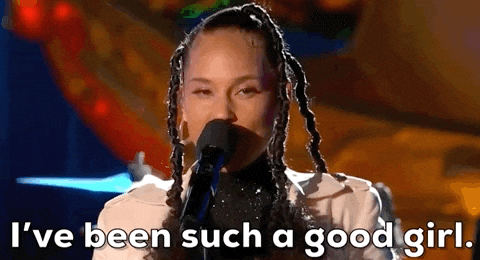 Giphy
GiphyBeing that I got my start as an entertainment writer, hear me when I say that I’m not someone who just has to go to a live concert every chance that I get. Oh, but baby, when I saw that El DeBarge was doing a City Winery tour and he was going to be here right before Christmas — I booked myself a ticket quick, fast and in a super-duper hurry! Shoot, I didn’t even want to go with someone because I plan to give him and that falsetto voice of his my complete and undivided attention. LOL.
I don’t know what it is about the holiday season that makes live music that much more enjoyable — but if there is a concert that features one of your favorite artists happening right through here, consider that to be a cool way to “tour your city” while cultivating a really awesome memory at the same time.
9. Also, Go Ice Skating
 Giphy
GiphyOne of my fondest memories of time with my father is going ice skating. We actually would do it in the summer (because that is when I would visit him) and, every year, he would get me a new ice skating outfit. Even now, when I watch someone ice skate (even in movies; like in the classic movie Garden State), I will have warm fuzzies.
Anyway, if you’ve never been before, go. If it’s been forever since you have, also go. There is something that is very sweet and so signature Christmas about it. Plus, it’s a top-tier form of exercise.
10. Take a Christmas Lights Tour
 Giphy
GiphyAnother one of my favorite Christmas memories is driving through neighborhoods and looking at the Christmas lights. And just like a Christmas concert can be a form of hometown touring, so can doing this if you decide to choose a couple of areas where you’ve never really been or rarely frequent.
Now are you excited about the thought of experiencing a holiday-themed staycation?
I thought you would be. ENJOY!
Featured image by Shutterstock



